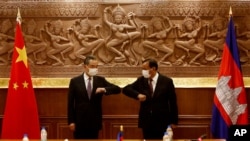Chinese Foreign Minister Wang Yi’s Asia tour this month following visits to the same region by two U.S. officials will intensify a superpower tug-of-war. Analysts say smaller countries can get a bounty of assistance from both China and the United States as long as they avoid offending Beijing.
Countries in Asia stand to get military equipment and training from Washington along with economic aid from Beijing, which is already building core infrastructure in much of Eurasia. Both nations are passing out COVID-19 vaccinations. Smaller, sometimes impoverished nations stand to be rewarded by both sides unless they get too cozy with Washington, scholars believe.
“This soft power competition between the U.S. and China has some benefits to the smaller countries where they can be an object of courting in the soft power competition, but at the same time the room for maneuver for them is also increasingly narrowed,” said Alexander Vuving, professor at the Daniel K. Inouye Asia-Pacific Center for Security Studies in Hawaii, a U.S. Department of Defense institute.
Wang on Friday reached Vietnam, his first of four stops, to discuss trade, economic ties and political trust. Vietnam said it is taking “its relations with China as a top priority in its foreign policy.” This may cause tension with the U.S. which, since 2017, has pushed for a stronger partnership with Hanoi.
The Chinese foreign minister’s visit coincided with a deal Vietnam signed with Japan to allow for exports of Japanese defense equipment and technology. Vietnam’s acquisition of these goods appears to be in response to China’s growing aggressiveness and influence in the region.
The United States looks to Asia for allies in checking the expansion of China, though analysts say it is not known for punishing smaller countries that hew toward Beijing.
Vaccine diplomacy
Wang pledged 3 million COVID-19 vaccine doses after the U.S. government offered 1 million new doses in August. The U.S. also agreed to set up a U.S. Centers for Disease Control and Prevention regional office in Hanoi. Vietnam’s case shows “a competitive flavor” between superpowers, said Yun Sun, co-director of the East Asia program at the Stimson Center in Washington.
Over the weekend Wang took another 3 million doses to Cambodia, which also accepted a $270 million grant from China, the VOA Khmer service reported. Cambodia already leans strongly toward China over the United States, Vuving said, and Wang hopes to lock in that preference.
The Balancing act
In Singapore on Monday, Wang said on his ministry’s website that China hopes to “deepen practical cooperation.” Both China and the United States see Singapore as a neutral, sometimes analytical force in Asia, with China particularly happy when the city-state calls for calm, Sun said.
Vietnam and Singapore have achieved a “balancing act” between superpowers, Vuving said. Earlier this month, China deepened bonds with the Philippines through an aid pledge after the Southeast Asian state agreed to restore a Visiting Forces Agreement with the U.S. government, an analyst told VOA.
U.S. forces have helped train Filipino counterparts for any potential operations in the South China Sea, parts of which Manila and Beijing dispute.
Consequences of US ties
South Korea, which Wang visited Tuesday and Wednesday, shows what China can do when a country veers too close to the United States, said Stephen Nagy, senior associate professor of politics and international studies at International Christian University in Tokyo.
After Seoul agreed with Washington to install a missile detection system that might see into China as well as its archrival North Korea, in March 2017, Beijing banned package tours to South Korea and caused a double-digit percentage decline in Chinese visits.
China also has “engaged in economic coercion” against Australia and Taiwan when once friendly ties became strained, Nagy added.
This month South Korea became one of the world’s few countries with the capability to fire ballistic missiles from “extremely quiet” submarines. This is part of a “strategic arsenal” that will cause concern in China given Seoul’s longstanding alliance with Washington, said Steven Kim, a visiting research fellow with the Jeju Peace Institute in South Korea.
Wang will probably talk to Korean counterparts about health and economic cooperation “with stern implicit comment” that it should value its economic ties with China, Nagy forecast.
“I think that the overall diplomacy is one that would be characterized by trying to produce constructive engagement, but of course, telling states that Wang Yi will be visiting that they need to proceed carefully in terms of the kind of relationships they’re building with the United States,” he said.
Back-to-back diplomacy
Wang’s visit follows trips by U.S. Defense Secretary Lloyd Austin in July to Singapore, Vietnam and the Philippines as well as U.S. Vice President Kamala Harris’s trip to Vietnam and Singapore last month.
U.S. and Chinese officials have done back-to-back diplomacy in the past, including the Chinese defense minister’s whirlwind Asia tour a year ago this month following anti-China statements by then-U.S. Secretary of State Michael Pompeo.
The recent flurry of visits shows a growing Sino-U.S. “rivalry,” Sun said. For smaller countries “to maximize the benefits and minimize the risks, that’s going to be hard because with great power competition in mind, neither Beijing nor Washington is leaving stones unturned to push for their own agenda,” she said.




